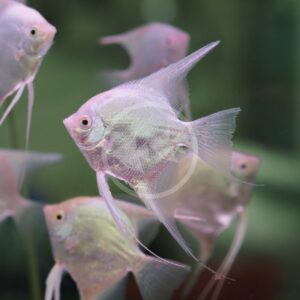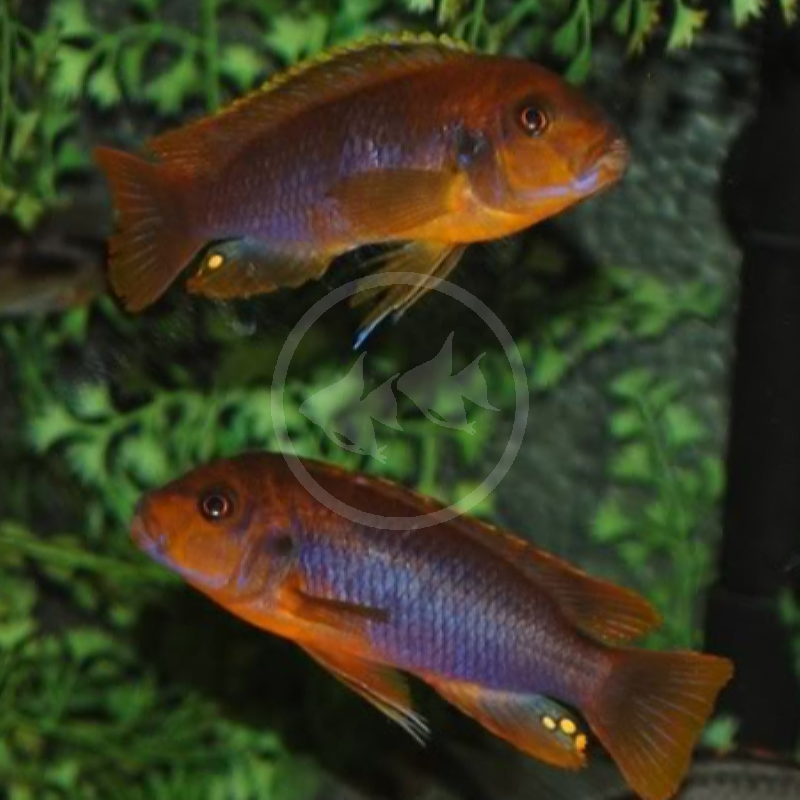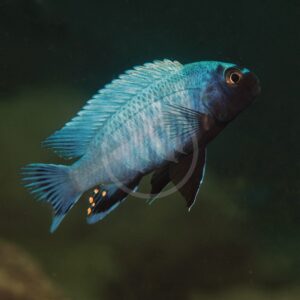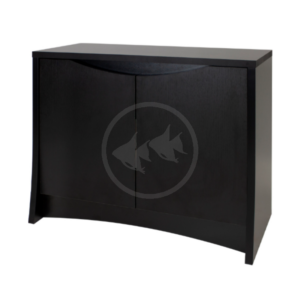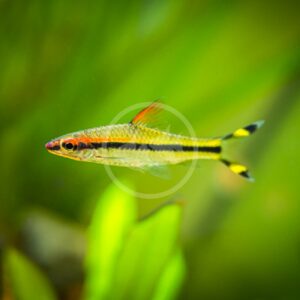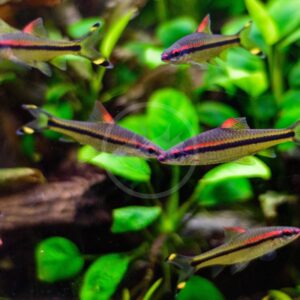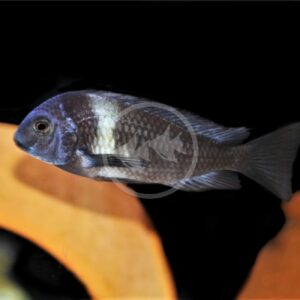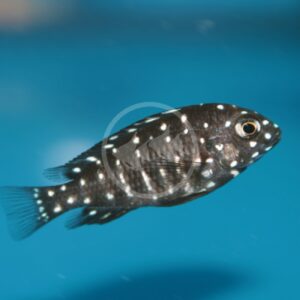CICHLID – RUSTY
Iodotropheus sprengerae
$9.99 – $14.99Price range: $9.99 through $14.99
The Rusty Cichlid are endemic to shallow, rocky shorelines of southern Lake Malawi. While the Rusty cichlid is often referred to as a ‘mbuna’ given its body shape, it does not act as aggressively as other species within this group. Rusty cichlids are known for their stunning orange and purple body coloration and bright yellow fins, a true standout fish! Because they have a more mild temperament, Rusty cichlids make for great dither fish in African cichlids aquariums. One of the smaller African cichlids, an adult Rusty cichlid can reach a size of approximately 3″.
Care Level: Moderate
Temperament: Semi-Aggressive
Live Plant Safe: No
General Description: The Rusty Cichlid are endemic to shallow, rocky shorelines of southern Lake Malawi. While the Rusty cichlid is often referred to as a ‘mbuna’ given its body shape, it does not act as aggressively as other species within this group. Rusty cichlids are known for their stunning orange and purple body coloration and bright yellow fins, a true standout fish! Because they have a more mild temperament, Rusty cichlids make for great dither fish in African cichlids aquariums. One of the smaller African cichlids, an adult Rusty cichlid can reach a size of approximately 3″.
Diet Requirements: Rusty cichlids are omnivorous, but a greater proportion of their diet should be vegetable based. Various high quality vegetable based flake foods that contain spirulina algae and sinking pellet foods are ideal. Frozen foods such as spirulina or standard brine shrimp and bloodworms are also excellent choices. High percentage protein foods should be fed in moderation. Variety is the spice of life in order to maintain color, immune function and longevity of your fish.
Care Requirements: An established minimum 55 gallon aquarium is ideal for Rusty cichlids. Biweekly water changes are encouraged to keep water parameters in good condition (Nitrates < 30 ppm). The aquarium should be aquascaped generously with stacked rocks to create many hiding spaces and caves, but some unobstructed and open swimming space should also be provided. A sandy or fine substrate is preferred and the aquarium needs to be well oxygenated. African cichlid specific substrates, or even marine Aragonite substrate, are great choices because they will buffer the pH and alkalinity to levels characteristic of Lake Malawi. Rusty cichlids will do well with other Malawian cichlids that are not overly pugnacious. Recommended water conditions, 74-80° F, KH 10-25, pH 7.5-8.5.
Purchase Size: Medium: 1-1/2” to 2”
Note: Your item may not look identical to the image provided due to variation within species. Purchase sizes are approximate.
Dry goods orders are shipped via US Postal Service or UPS to the address provided at checkout based on the selection made in your website shopping cart. Product is carefully packed to help prevent any damage during shipping. Once processed you will receive a shipment notification via email with tracking number, and delivery notification. Please allow 48 hours for processing after your order is placed.
Perishable items (i.e. live plants, refrigerated/frozen foods) are shipped via US Postal Service 2-3 day to the address provided at checkout for a $25.00 flat rate charge. Items are packed with secure packing material and heat, cold, or Cryo packs as needed to maintain safe temperatures during transit. If one or more perishable items are in the shopping cart at checkout the $25.00 perishable shipping charge will automatically appear and need to be selected. Once processed you will receive a shipment notification via email with tracking number. Please allow 48 hours for processing after your order is placed.
Livestock (i.e. fish, invertebrates, coral) are shipped via UPS Overnight to the address provided at checkout for a $55.00 flat rate charge. Livestock is packed in insulated styrofoam boxes with secure packing material and heat, cold, or Cryo packs as needed to maintain safe temperatures during transit. If one or more livestock items are in the shopping cart at checkout the $55.00 livestock shipping charge will automatically appear and need to be selected. Livestock is shipped Monday through Wednesday ONLY (no weekend delivery is available) weather permitting, and we reserve the right to delay shipping until conditions are appropriate for safe arrival. Once your order is placed we will contact you to arrange the best shipping date based on these criteria. Someone must be available to receive the livestock order on the first delivery attempt. Once processed you will receive a shipment notification via email with tracking number. Please allow 48 hours for processing after your order is placed.
For mixed dry goods/perishable & livestock orders items will be shipped via their corresponding shipping methods outlined above. Dry goods will be shipped via US Postal Service or UPS based on your selection and checkout, while livestock will ship via UPS Overnight for a $55.00 flat rate charge. You will receive separate notifications and tracking numbers for the dry goods and livestock. Please note due to different carriers and shipping methods dry goods and livestock may arrive on different days.
Related products
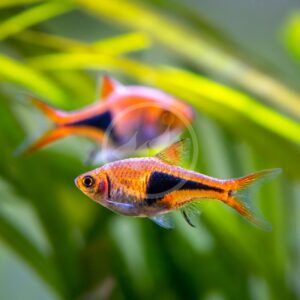
RASBORA – HET / HARLEQUIN
Trigonostigma heteromorpha
$5.99 – $8.99Price range: $5.99 through $8.99
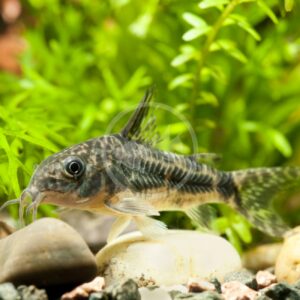
CATFISH – CORYDORAS PEPPERED
Corydoras paleatus
$6.99 – $9.99Price range: $6.99 through $9.99
BARB – DENISONII / ROSELINE SHARK
Sahyadria denisonii
$9.99 – $79.99Price range: $9.99 through $79.99
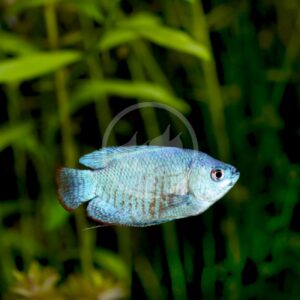
GOURAMI – DWARF POWDER BLUE
Trichogaster lalius
$11.99 – $16.99Price range: $11.99 through $16.99
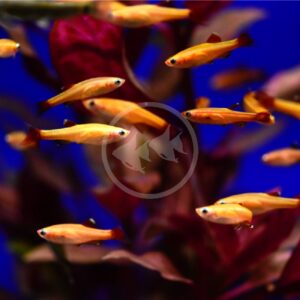
MINNOW – WHITE CLOUD MOUNTAIN GOLD
Tanichthys albonubes
$5.99
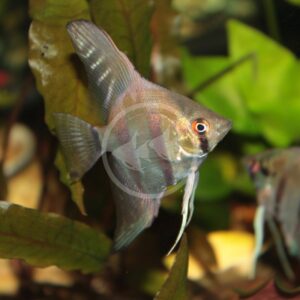
ANGELFISH – FW SILVER
Pterophyllum scalare
$9.99 – $39.99Price range: $9.99 through $39.99
